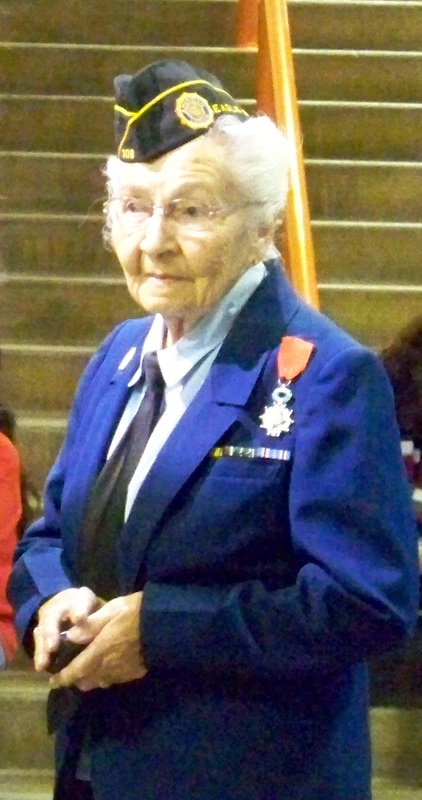First Lieutenant Marcella Ryan LeBeau is pictured during an honoring for women Veterans at the Lakota Nation Invitational
By Vi Waln
“Nurses frequently demonstrated their ability to remain calm in unpredictable and dangerous situations.” From: The Army Nurse Corps, a Commemoration of World War II Service.
When we think about our young men and women who are serving in the military, we generally are most concerned about those who are in the areas of the world which are combat stricken. Even though President Obama has worked hard to bring many of our troops home, there are still Lakota men and women who are stationed in parts of the world far away from their homes.
There are many fields in which to go into when one joins the military. Perhaps some of the most essential and challenging military jobs are those which are filled by medical staff. Doctors, nurses and medics are charged with treating wounded soldiers. Their job is a difficult one. They are to be commended for all of their hard work helping their fellow soldiers to recover from injuries.
I was fortunate to find a video on the Library of Congress website of an interview done with First Lieutenant Marcella Ryan LeBeau, who is Cheyenne River Lakota. She volunteered to go into the military service in 1943 to serve in the Army Nurse Corps. She traveled overseas and helped to set up the 76th General Hospital in Liege, Belgium during World War II where she was stationed. She returned to work at the IHS in Eagle Butte and retired after 31 years of service.
In one segment of the interview, Ms. LeBeau recalls caring for a wounded soldier who was from Rosebud. “I went over to see him and he had lost both legs and they were afraid he might commit suicide. His name was Eugene Roubideaux, I took him newspapers from South Dakota and offered to write letters home for him but he refused. Then one day he was gone. I looked for him for 40 years but I could never find him.”
One day she received a call from a lady who said Eugene was her father. “I was overcome with emotion. She gave me his phone number and address. I couldn’t call him right away and when I did call I asked him if he remembered the nurse who stood at his bed in Liege, Belgium. He said ‘I never forgot.’ We were able to invite him and his family to Eagle Butte to have an honoring dinner for him and his family.”
Ms. LeBeau was awarded a medal from the Belgium government for her service during World War II. She spent one year working at the 76th General Hospital in Liege, Belgium. It was a Campaign medal with three battle stars because they were in the area of the battle.
“I think having been there it has given me a greater appreciation of life, and of people, and the simple things that make us who we are,” she said. “It’s been one of the greatest honors and privileges of my life to have been there.”
Wopila, Ms. LeBeau for your brave service in World War II!
By Vi Waln
“Nurses frequently demonstrated their ability to remain calm in unpredictable and dangerous situations.” From: The Army Nurse Corps, a Commemoration of World War II Service.
When we think about our young men and women who are serving in the military, we generally are most concerned about those who are in the areas of the world which are combat stricken. Even though President Obama has worked hard to bring many of our troops home, there are still Lakota men and women who are stationed in parts of the world far away from their homes.
There are many fields in which to go into when one joins the military. Perhaps some of the most essential and challenging military jobs are those which are filled by medical staff. Doctors, nurses and medics are charged with treating wounded soldiers. Their job is a difficult one. They are to be commended for all of their hard work helping their fellow soldiers to recover from injuries.
I was fortunate to find a video on the Library of Congress website of an interview done with First Lieutenant Marcella Ryan LeBeau, who is Cheyenne River Lakota. She volunteered to go into the military service in 1943 to serve in the Army Nurse Corps. She traveled overseas and helped to set up the 76th General Hospital in Liege, Belgium during World War II where she was stationed. She returned to work at the IHS in Eagle Butte and retired after 31 years of service.
In one segment of the interview, Ms. LeBeau recalls caring for a wounded soldier who was from Rosebud. “I went over to see him and he had lost both legs and they were afraid he might commit suicide. His name was Eugene Roubideaux, I took him newspapers from South Dakota and offered to write letters home for him but he refused. Then one day he was gone. I looked for him for 40 years but I could never find him.”
One day she received a call from a lady who said Eugene was her father. “I was overcome with emotion. She gave me his phone number and address. I couldn’t call him right away and when I did call I asked him if he remembered the nurse who stood at his bed in Liege, Belgium. He said ‘I never forgot.’ We were able to invite him and his family to Eagle Butte to have an honoring dinner for him and his family.”
Ms. LeBeau was awarded a medal from the Belgium government for her service during World War II. She spent one year working at the 76th General Hospital in Liege, Belgium. It was a Campaign medal with three battle stars because they were in the area of the battle.
“I think having been there it has given me a greater appreciation of life, and of people, and the simple things that make us who we are,” she said. “It’s been one of the greatest honors and privileges of my life to have been there.”
Wopila, Ms. LeBeau for your brave service in World War II!


